Tax Changes Coming This April – What You Need to Know!
Big tax changes are coming this April! From road tax hikes (even for EVs!) to stamp duty increases, rising capital gains tax, and higher minimum wages, these updates could impact your finances. Stay ahead —read our latest blog to find out what’s changing and how to prepare.
HMRCTAX COMPLIANCETAX CHANGESAPRIL 1ST
The Tax Faculty
4/2/20253 min read
1. Road Tax Rises – Even for Electric Vehicles!
For the first time, electric vehicle (EV) owners will have to pay road tax. Here’s how it breaks down:
New electric cars: First-year tax rises to £10 (previously £0).
EVs under £40,000: Annual tax from year two will be £190.
EVs over £40,000: The luxury car tax means an annual charge of £600.
Hybrid and non-EV cars will also face increases, with petrol and diesel car tax rising across the board. The first-year tax on a new petrol or diesel car that was previously £220 will now double to £440.
2. Stamp Duty Increases – More Costs for Buyers & Investors
From 1 April, stamp duty thresholds are changing:
The standard threshold drops from £250,000 to £125,000.
First-time buyers will only benefit on purchases up to £300,000, down from £425,000.
Investors and landlords face higher Stamp Duty Land Tax (SDLT) charges, making buy-to-let less tax-efficient.
3. Capital Gains Tax (CGT) & Property Sales
If you’re selling a second home or investment property, CGT rates are now 18% and 24%, depending on your tax bracket. Just a reminder, second home buyers now face a 5% SDLT surcharge and this has been the case since October 2024.
4. National Minimum Wage Increases
From 1 April, wages will rise:
Workers aged 21+: £12.21 per hour (up from £11.44).
Ages 18-20: £10 per hour.
Apprentices & under-18s: £7.55 per hour.
Good news for employees, but an added cost for businesses.
5. Changes for Furnished Holiday Lets (FHL)
Holiday lets will no longer receive tax advantages over long-term rentals from 1 April for companies and 6 April for individuals. This means no more beneficial capital allowances and reduced reliefs.
6. Company Car Tax & Air Passenger Duty Increases
Company car tax for EVs rises from 3% to 9% by 2030.
Petrol and diesel benefits-in-kind rates increase based on CO2 emissions.
Air Passenger Duty (APD) rises, with long-haul flights costing up to £1,141 in tax per passenger for private jets.


From higher road tax and stamp duty changes to rises in company car tax and minimum wage, the new tax year brings a wave of financial shifts that could impact both individuals and businesses.
While not all of these changes directly relate to the services we provide at The Tax Faculty, they are still essential to consider as we step into the new financial year.
Some of the details have been handily summarised by Accountancy Daily, and we’ve broken them down here for easy reading.
What’s Changing This April?
As we enter the new tax year, these changes may impact your personal finances, property investments, or business operations. Staying ahead of tax changes can help you avoid unexpected costs and maximise savings. If you’re unsure how these shifts affect you, speaking with a trusted tax professional is always a wise decision.
Ready for the new financial year? Let The Tax Faculty help you navigate these changes with expert advice.
If you have any questions regarding any aspect of tax filing or planning, contact us at The Tax Faculty for a free consultation.


Final Thoughts -Stay Informed and Plan Ahead
Capital Gains Tax Expertise: The Tax Faculty LLP Managing Partner Charles Tateson Named UK Capital Gains Tax Advisor of the Year 2023
The Finance Monthly Taxation Awards recognises the achievements of tax professionals from around the globe.
Winning such an award is no small feat. It is a reflection of hard work, extensive knowledge, and an ability to navigate the intricacies of the UK tax system.
Read more about Charles and the award here.



Contact Us
Contact us today on freephone 0800 0016 878 for a free consultation on all tax issues, or fill out the handy form below and we'll get back to you as soon as possible.
Alternatively, you can email us at info@thetaxfaculty.co.uk or complete the form below.
(Please note, non-UK callers may need to call 0207 101 3845 if your line cannot connect to our 0800 number)
Feel free to contact us through WhatsApp - we accept calls and messages.
Simply click the WhatsApp button below:
The Tax Faculty LLP - info@thetaxfaculty.co.uk
Call us on 0800 0016 878 for a free consultation
Copyright © 2024 The Tax Faculty LLP - All Rights Reserved


